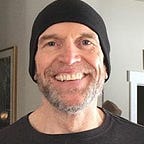“Be the Change You Want to See” — Why Change MUST Always Begin With Us
In the beginning, somebody…
Told a story. Made something. Made something that made things. Drew a picture. Used their voice melodiously. Moved a certain way and did it again. Took something apart, put it back together, and built another thing like it. Watched how weather and sky and flora and fauna responded to the passage of time. Sprinkled dry leaves on meat and ate it. Drew a line in the sand and beat someone who crossed it. Traded this for that. Resolved a dispute. Helped a sick person feel better. Took something shiny from the earth or sea and wore it. Had an uncanny experience and explained it.
And then somebody else did, too — and then somebody else after that, and more somebodies after that, until the human race had organized itself into families, clans, tribes, city-states, and nations, each with its own take on life in this world. Millennia later a worldwide civilization had emerged, organized around trans-cultural institutions of law, economics, science, religion, industry, commerce, education, medicine, arts and entertainment….
And then you and I were born as new members of a highly-evolved human culture of innumerable, impossibly complex, interwoven layers.
From our first breaths we were integrated into site-specific cultural institutions that informed our beliefs about how the world works and our place in it. Those institutions weren’t external to us, they were embodied in us — microbes of meaning lodged in our neural pathways and physical biome. Our brains formed around the beliefs of our culture — our neurons drank them in, and our neural networks were wired up with the necessary assumptions, logic, and leaps of faith.
These cellular structure informed what it meant for us to be alive on the Earth, individually and in community. They shaped our observations and awareness, experiences and interpretations, tastes and sensibilities. They defined what is real and imaginary, set limits around what is true and false, acceptable and taboo. And then they reinforced the rightness of it all with feelings of place and belonging, usefulness and meaning. When that was done, our brains and bodies were overlaid with a foundation for status quo — the way things are, and are supposed to be.
All that happened in an astonishing surge of childhood development. Then came puberty, when our brain and body hormones blasted into overdrive, dredging up our genetic and environmental beginnings and parading them out for reexamination. We kept this and discarded that, activated these genes instead of those. (The process by which we do that is called epigenetics, and it explains why your kids aren’t like you.) We also tried on countercultural beliefs. welcoming some and rejecting others. From there, we entered adult life freshly realigned with a differentiated sense of self, us, and them.
From there, adult life mostly reinforces our cultural beginnings, although the nuisances and opportunities of change periodically require us to make and reaffirm shared agreements in our communities, professions, workplaces, teams, and other groups, each time reaffirming and refining our shared cultural foundations. In doing so, we sometimes flow with the changing times, and sometimes retrench with nostalgic fervor.
Where does all this biological, cognitive, and social development and maintenance happen? In the only place it possibly could: in the hot wet darkness inside the human body’s largest organ — our skin. Yes, there is a “real world” out there that we engage with, but the processing and storing of experience happen inside — encoded in our brains and bodies.
Which is why individual and cultural change must always begin with us — literally inside of us, in our physical makeup — because that’s where our world and our experience of it are registered and maintained. Gandhi’s famous words are more than a catchy meme, they describe basic human reality: if we want things to change, then we must be transformed. Think about it: we have no belief, perception, experience, or concept of status quo that is not somehow registered in our brains and bodies, so where else could change happen? (Unless there’s something like a humanCloud where it can be uploaded and downloaded — but that’s another issue for another time.)
The implications of locating human experience in our physical selves are far-reaching and fascinating. We’ll be exploring them.
Originally published at iconoclast.blog on January 17, 2019.
